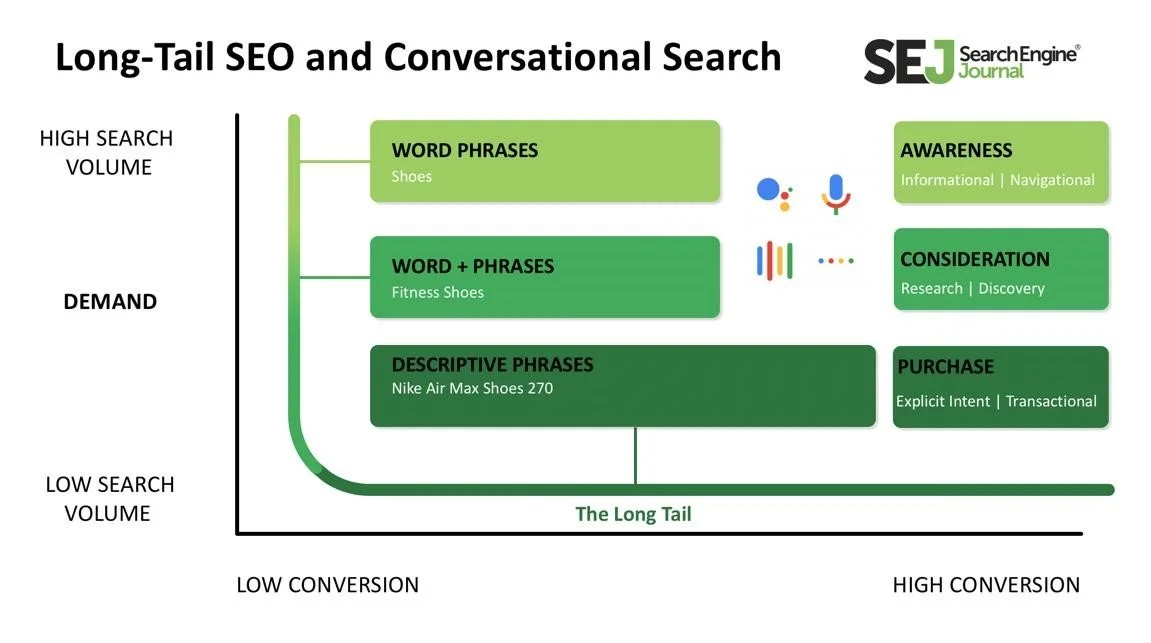Excelling in the Long-Tail Keyword SEO Game
Keeping your content ‘evergreen’ and consistent is key to continuously improving your domain’s search engine optimization (SEO) over the long term. Defining your company’s ‘seed’ keywords is the starting point of building any new website. Seed keywords are short-tail keywords that are highly searched and highly competitive in Google search results.
Long-tail keywords, on the other hand, offer an opportunity to improve your site’s SEO for specific market niches. Identifying your company’s strategic long-tail keywords that complement your seed keywords can deliver a quicker return on your digital marketing investments.
So, What Are Long-Tail Keywords?
Long-tail keywords are a string of at least three words that are “highly targeted search phrases that specifically serve searcher intent.” Search Engine Journal calls these keywords long-tail, “because if you were to plot your keywords by their search volumes, these would be on the ‘long-tail’ end of the search demand curve… These keywords typically have low search volume, low competition, and high conversion rates.”
It may seem counterintuitive, but ranking for less-searched, more specific long-tail keywords can pay off. Here is an excellent example of how your long-tail keyword SEO strategy could result in a high conversion rate:
Because long-tail search terms are so specific, a prospective customer searching for a specific product or service is usually closer to the point of purchase.
How Do You Determine Your Long-Tail Keywords?
Leverage tools like Google Search Console or Bing Webmaster Tools (free) or other paid services to give you insights into the keywords for which your domain is already ranking. Are these the ones you expected?
Evaluate the competition within your industry. Get started by subscribing to the free plans offered by Moz or KWFinder to compare your site’s keyword ranking versus select competitive domains. This may reveal the keywords for which you *should* be ranking – or help you identify strategic long-tail keywords that are similar, but different.
Optimizing Your Keyword Portfolio
Assess how crowded your target keyword space is. Moz and KWFinder calculate a keyword SEO difficulty factor for page ranking in a competitive keyword space. A high keyword search volume not only poses hurdles to organic Google search rankings but also influences the cost of a company’s paid advertising campaign.
Seed keywords are usually competitive but essential for organic SEO. Seed keywords should be well thought-out and related to your long-tail keywords that focus on your target markets’ conversion points and search intent. Make sure your portfolio of seed and long-tail keywords is balanced for your company.
Keyword Placement
These long-tail keyword insights should drive your content management strategy to improve your SEO. Keep in mind that your identified keywords should be placed strategically: in your domain, if possible; your title headers (i.e., H1, H2, H3, etc.); subdirectory URLs (i.e., H1 blog titles should also be the name of your URL); etc.
Remember to name your image files strategically, not only to describe the content but also to include your keywords (short- and long-tail). Alternative text for graphic files is another opportunity to insert content descriptions and keywords.
Ensure that keyword placement occurs in the introductory paragraph of the body text and page descriptions and/or excerpts. For more recommendations, read our blog for ways to improve your site’s organic SEO and develop a robust keyword placement strategy.
Finally, be patient and remember that SEO isn’t an overnight success – you are playing the long game.
ELEVATE NEXT is a digital marketing and business management consulting company that develops a customized SEO strategy and analytics tracking for its clients. Subscribe to ELEVATED NEWS to stay up-to-date on the latest website design and optimization articles, or contact us with your thoughts and comments. We would love to hear them!





A great website is an investment—but it doesn’t have to be made all at once. For smaller organizations, building a site in stages is a smart, scalable strategy that helps manage costs and delivers a quicker return on investment.